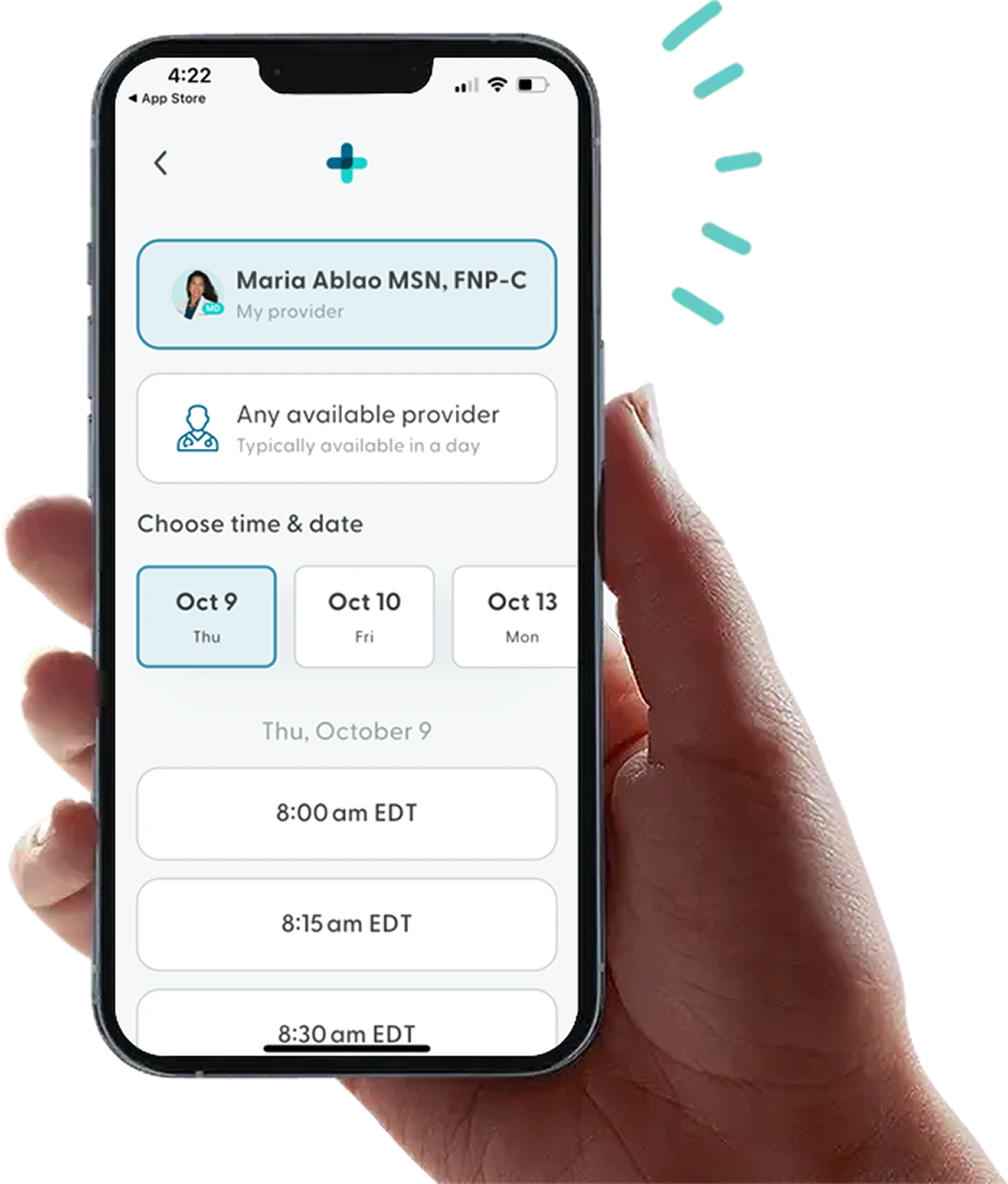Is Peanut Butter Good for Weight Loss? Here’s What You Should Know
Peanut butter is a staple in many households, but it’s much more than just a tasty sandwich spread.
Not only is peanut butter packed with essential nutrients that support our overall well-being, but consuming it regularly can also provide various health benefits.
In this article, we take a closer look at what makes peanut butter so healthy, the benefits of consuming it, and how you could incorporate this spread into a balanced and healthy diet.
Get prescription weight loss medication online.
Find out if you're eligible for GLP-1s, and get started on your weight loss journey for as low as $75/month.


What Makes Peanut Butter Healthy?
Making peanut butter is a relatively simple process that doesn’t typically involve unhealthy chemical preparation methods.
Once the peanuts have been harvested, they are roasted and ground. The grinding process is done in several stages until the desired texture is produced.
Depending on the manufacturer, additional ingredients — like salt or sweeteners — are sometimes added to the peanut butter.
Throughout the manufacturing process, the peanut butter is tested for toxins and contaminants.
This ensures that no unhealthy substances are accidentally transferred into the product, which helps to make it safer to consume.
Nutritional benefits
Eating peanut butter has several nutritional benefits that can support our overall health. These include:
Rich source of protein: Peanut butter is an excellent source of protein, with about 7 grams per serving (two tablespoons). Protein is essential for building and repairing muscles and plays a crucial role in various bodily functions.
Healthy fats: Although peanut butter has a high-fat content, it primarily contains monounsaturated and polyunsaturated fatty acids. These are considered healthy fats, which can support heart health and reduce bad cholesterol levels.
Dietary fiber: With about 2 grams of fiber per serving, peanut butter can help promote digestive health and contribute to a feeling of fullness, which helps prevent overeating and weight gain.
Vitamins and minerals: Peanut butter is a good source of vitamins and minerals, including Vitamin E, magnesium, potassium, and zinc. These nutrients are essential for protecting tissues from damage, supporting immune function, and providing a source of energy.
Health benefits
Because of its rich nutritional profile, consuming peanut butter regularly offers various health benefits to improve our well-being. These include:
Supports heart health: The healthy fats in peanut butter can help decrease the risk of heart disease by lowering low-density lipoprotein (LDL) or “bad” cholesterol levels.
Weight management: Despite being high in calories, peanut butter can be a great addition to a weight loss diet. The combination of protein and fiber increases satiety, which helps you control your appetite and eat fewer calories — two essential components of losing weight successfully.
Blood sugar control: The fiber and healthy fats in peanut butter can also help regulate blood sugar levels. This is essential for maintaining steady energy levels throughout the day.
Reduced risk of certain diseases: Regular consumption of nuts and nut butters — including peanut butter — has been associated with a reduced risk of certain health conditions, such as type 2 diabetes and gallstones. This is due to their beneficial effects on heart health and body weight.
Tips for Incorporating Peanut Butter into Your Diet
Choose the right peanut butter
When shopping for peanut butter, look for products that are free of added sugars and trans fats.
Partially hydrogenated oil is a manufactured form of trans fat that can be detrimental to your health.
Instead, opt for products that contain only peanuts and a bit of salt. These options are the best choice for ensuring you get all of the nutritional and health benefits of natural peanut butter.
Use it in breakfasts
Peanut butter is a versatile ingredient that can be used in various breakfast foods. Some easy-to-make options packed with nutrients include:
Peanut butter on whole-grain toast, topped with banana slices or a sprinkle of chia seeds.
Smoothies with a tablespoon of peanut butter.
Oatmeal with a serving of peanut butter, topped with fruit and honey.
Create healthy snacks
Having healthy snacks on hand can be great for helping you avoid eating processed foods high in calories. You can add peanut butter to snacks in the following ways:
Fruit dips: Use peanut butter as a dip for apple slices, bananas, or pears for a quick snack.
Energy balls: Combine oats, peanut butter, honey, and your choice of add-ins — like chocolate chips, dried fruit, or even protein powder — to make no-bake energy balls.
Veggie sticks: A small amount of peanut butter can make a satisfying dip for carrot sticks or celery, adding both flavor and protein to a crunchy snack.
Use peanut butter in sauces
You can also eat peanut butter more regularly by using it as a base for sauces and dressings, including:
Asian-inspired dishes like noodles or chicken satay. Simply blend the peanut butter with soy sauce, honey, and ginger.
Dressings to drizzle over fresh chicken or vegetable-based salads. Whisk together peanut butter, vinegar, olive oil, and some spices to create this unique dressing.
Create protein-packed desserts
Since peanut butter is packed with protein, it can be a great ingredient to enhance the nutritional value of your desserts. A few delicious recipes include:
Peanut butter and banana ice cream
Homemade protein bars
Peanut butter cookies
By incorporating peanut butter into your desserts, you can take advantage of its benefits without overindulging.
How Can Peanut Butter Support Weight Loss?
Satiety and hunger management
One of the key factors in a successful weight loss journey is the ability to control hunger and reduce unnecessary snacking.
Thanks to its high protein and fiber content, a serving of peanut butter can help you feel fuller for longer and avoid cravings.
Protein is known for its ability to promote satiety, which slows down digestion and helps you feel full and satisfied after meals. Fiber adds bulk to your food, prolonging the feeling of fullness.
Consuming high protein and fiber together — as found in peanut butter — helps you curb cravings and reduce your caloric intake to support your weight loss goals.
Supporting a healthy metabolism
Peanut butter contains healthy fats that are essential for the body’s metabolic processes.
Monounsaturated and polyunsaturated fats can help maintain a healthy metabolism, which is an essential part of burning calories more efficiently.
The protein found in peanut butter can also increase the thermic effect of food (TEF) — the energy required to digest and absorb nutrients — and boost the metabolic rate.
When you have a faster metabolism, you burn more calories and start to lose weight.
Practicing portion control
While peanut butter can support weight loss, it’s also high in calories, which means practicing portion control is essential.
A standard serving of peanut butter — typically two tablespoons — contains about 190 to 200 calories. You typically don’t need much more than this to enjoy its health benefits.
Using measuring spoons or scales to portion your servings is a great way to help prevent overconsumption and ensure you stick to your weight loss goals.
Ready to achieve your weight loss goals?
Shed pounds with GLP-1 medication prescribed online by licensed healthcare providers for as low as $75/month.


Where Can You Learn More About Healthy Eating Habits?
If you’re looking for more information on healthy eating habits to help you lose weight and improve your health, LifeMD has got you covered.
LifeMD can connect you to a team of medical professionals who can help you create a weight-loss-friendly diet and provide guidance on shedding those excess pounds — all from the comfort of your home.
Make an appointment with LifeMD to learn more about sustainable ways to manage your weight and take control of your health, today.
More articles like this
Feel better with LifeMD.
Your doctor is online and ready to see you.
Join LifeMD for seamless, personalized care — combining expert medical guidance, convenient prescriptions, and 24/7 virtual access to urgent and primary care.

GLP-1
Zepbound® Wegovy® Saxenda®
This is it! Be part of the weight loss movement everyone’s talking about.
Get Started Now
 Medically reviewed and edited by
Medically reviewed and edited by 








